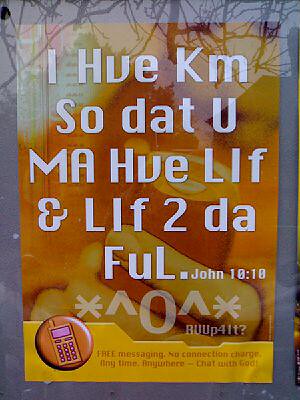
The poster seems to say "I have come so that you may live, and live to the full" (obviously I'm no student of the bible so perhaps Chun See can help me out here). I discovered this SMS Speak Translator and the translated results as follows:
- Original SMS Speak: "i hve km so dat u MA hve lif & lif 2 da ful"
- Converted to English: "eye hve km so dat you MA hve lif & lif to da ful"
Euan seemed aghast at the poster, although he didn't quite elaborate why. Perhaps it's that his local church (of all institutions) are resorting to using SMS Speak to get presumably the SMS-Speak Generation, i.e. Teens, to go to Church. Or maybe it's just the plain fact that it's SMS-Speak on UK-soil (the land where the English language originates).
I can use my LOLs and ROTFLs with the best of them. In fact, Pre-IRC/ IM days, I was reading war stories filled with acronyms like 'REMF's and 'SNAFU's (yeah, go figure those out).
But SMS-Speak, I don't quite grasp it as well.
Terms like LOL and SNAFU are acronyms (i.e. formed by picking out the first letter of the word in a phrase). It's a mnemonic device. SMS Speak, however, isn't one (at least not the way I see it). Some have termed it a language on it's own, or at least a corruption of the mainstream language which has established its legitimate sub-culture.
That's not to say I'm against using SMS Speak on posters, targeting at teens. The purpose of that poster was to draw Teens' attention to the church -- to put the church on the SMS Speaker's radar. The poster would have done its job, and more.
So I would want to try something like that for the library. I'm aware that in doing so, we'd have adults (teachers, even) writing in to complain that the library would be seen as encouraging or endorsing bad-spelling.
Maybe so.
Still, I'd do it. While I think highly of libraries, I don't think libraries have that sort of influence on teens. I wish we did, but we don't. Not to that large an extent.
I will accept SMS-Speak in informal situations. It's the blatant (mis)use of SMS-Speak in ALL occasions that I'm against -- strict no-no where formality is called for. Nevertheless, I will not preach to teens on the use of SMS-Speak. I'll let the English Language teachers do that.
I'm merely recognising the fact that there is such a sub-culture among teens. I'd even argue that if libraries -- by speaking their (SMS) language -- can draw them into our premises where there's a chance they'd use our collections (of which a large part is in proper written English), we're probably doing the English Language teachers a favour.
Technorati Tags: teen speak, sms speak, language, teen culture

I believe the verse quoted is John 10;10. The King James version reads; "I am come that they might have life, and that they might have it more abundantly."
ReplyDeleteWell actually in the old testament days, the name of God was spelled Y_hw_h (for Yahweh). The vowels were omitted out of respect for His name (I think). The similarities with modern day SMS-speak is quite uncanny isn't it?
ReplyDeleteActually liturgical Hebrew (and its predecessor Aramaic) were traditionally written without vowels. For example, the Torah scrolls in your local synagogue have no vowels. This is why kids studying for bar/bat mitzvahs tend to memorize their Torah portions...if they got lost while reading directly from the Torah, it'd be really hard to find their place again.
ReplyDeleteYou might be thinking of the more recent tradition of spelling "God" with a dash for the O. This is partly for respect, and partly because any piece of paper with God's name on it has to be disposed of in a special way according to Jewish tradition. So if you didn't fully spell out the word, you didn't have to worry about separating the piece of paper out for special disposal.
That's interesting to know Jennifer! Its fascinating to learn about the cultural and religious implications for the omission of vowels in this case. I know for sure that God's name is treated with utmost relevance in Jewish communities. In the Bible, it is also stated that God's name has a very high degree of reverence and honour.
ReplyDeleteInterestingly, they use the Word as a replacement for Jesus. ie in John 1:1 "In the beginning was the Word, and the Word was with God, and the Word was God".